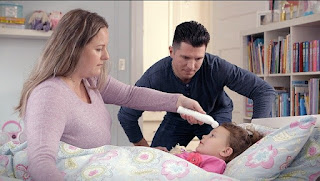No Need To Worry, Here's How To Overcome Children With Fever
 |
| No Need To Worry, Here's How To Overcome Children With Fever |
Children's health is the main concern of parents, especially mothers. When a child falls ill and has a fever, it is not uncommon for mothers to become anxious or even panic. In fact, there are various ways to deal with children with fever that are effective and easy to do at home.
When a child has a fever, his face may appear flushed and his body hot and sweaty. This condition is actually very common in children. However, fever in children often makes parents confused and anxious, especially for mothers who are having children for the first time.
The reason mothers don't need to worry when their children have a fever
The normal body temperature of a child is 36.4–37°C. A child can be said to have a fever if his body temperature reaches 38 ° C or more. To find out your little one's body temperature, you can use a thermometer.
When your little one has a fever, you don't need to panic, okay? Fever in children is generally harmless and can actually be a good sign. High body temperature is the body's natural way of fighting disease-causing germs.
Fever is also usually experienced by children after immunization which is a sign that their body is working to make antibodies to protect them from certain diseases.
So, it is important for mothers to remember that fever is not a disease, but a sign or symptom. In addition, children who have a fever do not always need special treatment.
If your little one has a fever but is still actively playing, eating and drinking well, and his skin color is normal, you don't need to worry. Fever in children will usually go down by itself within 3 days.
How to Overcome a Child's Fever
If a fever makes your little one feel uncomfortable, for example, he becomes fussy, looks lethargic, or is not interested in playing, there are several ways you can do this, namely:
1. Provide adequate fluid intake
Fever can make a child lose body fluids more quickly than usual. To prevent dehydration in children, provide him with adequate fluid intake, either by giving him water, soup, or fruits that are high in water, such as watermelon, oranges, or melons.
2. Make sure the child rests
When a child has a fever, it doesn't mean he has to sleep all day. The most important thing is that he gets enough rest. If the child is cold, avoid covering him with thick clothes and blankets. This can actually prevent the release of body heat, so that the body temperature will increase.
Also, avoid bathing your child in cold water because it can make the fever worse. Instead, bathe the child with warm water. Also make sure the room temperature is not cold, so that the child does not get cold after bathing.
3. Give fever reliever medicine
If your little one is fussy, you can give him pain relievers and fever reducers, such as paracetamol or ibuprofen. However, in giving fever medicine to this child, there are several things that need to be considered, namely:
- Do not give aspirin to children under 16 years of age.
- Do not combine ibuprofen and paracetamol without consulting your doctor.
- Do not give paracetamol to children under 2 months of age.
- Do not give ibuprofen to children who have asthma, are under 3 months of age, or who weigh less than 5 kg.
Before giving fever medicine to your little one, make sure you read the drug packaging label first to find out the appropriate dose for his age. Store fever-reducing medicine in a dry place, out of direct sunlight, and out of reach of children.
Fever-reducing medicine is one of the medicines that need to be at home. That way, if at any time your little one has a fever, the mother is ready to deal with it and there is no need to panic.
To prevent fever in children, the most effective way is to limit exposure to germs that cause infection. Show children how to wash their hands properly with water and soap or hand sanitizer, and remind them to cover their mouths when coughing or sneezing and not to share eating utensils with others.
Although generally harmless, be aware if your child has a fever accompanied by the following signs:
- Diarrhea that lasts a long time or vomits repeatedly
- Signs of dehydration, such as low urine volume, no tears when crying, or your child being less active than usual
- Ear pain, ear discharge, or decreased hearing quality
- Febrile convulsion
- Fever after 24 hours in children under 2 years of age, or more than 5 days in children older than 2 years
- Frequent fever, even if it only lasts a few hours each night
- Difficulty breathing or breathing faster than usual
If your little one's fever doesn't improve with various ways of dealing with the child's fever above or his body temperature is more than 39°C, immediately take him to the doctor for a proper examination and treatment. This is because a severe fever can be a symptom of a serious condition.
Related Search:
- children with fever and headache,
- children with fever and rash,
- children with fever for 3 days,
- high white blood cell count in children with fever,
- seizures in children with fever,
- hallucinations in children with fever,
- leg pain in children with fever,
- heart rate for children with fever,
- children with fever blisters,
- hives in children with fever,
- children with fever of 103,
- ear pain in children with fever,
- viruses in children with fever,
- children with fever for 5 days,

Post a Comment for "No Need To Worry, Here's How To Overcome Children With Fever"